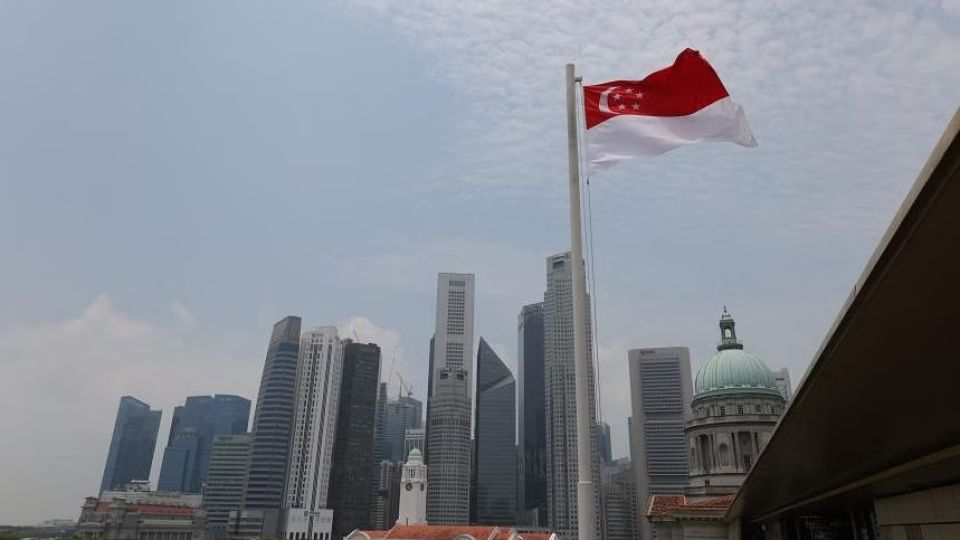May 9, 2024
SINGAPORE – As the United States and China seek out a new equilibrium in their relationship, Singapore must brace itself for possibly a decade or more of unpredictability, and hopefully help steer global events towards peace, rather than war, said Deputy Prime Minister Lawrence Wong.
In an interview with The Economist magazine on May 6, he said the Republic is neither pro-China nor pro-America, but “pro-Singapore”.
DPM Wong said the global order is shifting, and the transition will be messy because while America’s unipolar moment has ended, it remains a pre-eminent power in a world that will have more than one major power.
“China certainly looks at the US as trying to contain, encircle, and suppress them, and trying to deny them their rightful place in the world,” he said in a transcript released by the Ministry of Communications and Information on May 8.
It is not just the leadership that thinks like that, but a lot of Chinese officials, noted DPM Wong, who will take over as Singapore’s fourth prime minister on May 15.
“They feel that there is this containment to put China down; there is that sense, and for every action, there will be an opposite reaction,” he added.
Asked how Singapore will deal with the scenario where American tech sanctions and controls lead to a complete split into two technology systems, DPM Wong noted that a lot of these sensitive technologies lie in the hands of American firms operating out of the Republic.
Singapore would expect these firms to comply fully with export restrictions, but it hopes that such restrictions will be carefully calibrated. A technological bifurcation would be detrimental not just for Singapore, but also for the US and the whole world, he stressed.
He said that while militaries are very mindful about collateral damage, retaliation and escalation in conventional warfare, it is less straightforward to assess the fallout from using economic and financial tools for geopolitical purposes, he said.
“We do not have so much experience with it; if we are not careful, it will have profound implications to the global economy but worse still, for global stability,” he said.
Asked about the US’ decision to seek a change in identity and ownership of TikTok, which is headquartered in Singapore, DPM Wong said it was America’s prerogative to decide how to deal with the social media platform.
“But from our point of view, when it comes to social media, that does not count as national security,” he said, noting that there are social media companies from all countries here in Singapore, and the Republic does not see this as a national security risk.
DPM Wong said China now sees itself as a strong country, whose time on the world stage has come. This means the Chinese want to be more assertive about their national interests, and this includes overseas.
As with all big countries, China will have to learn that if it pushes its way around other countries and overdoes it, it will engender a backlash, including in this region.
“That is why they cannot go too far, and they will have to learn that lesson,” DPM Wong said. “It is a lesson that all big countries go through. America goes through that lesson too.”
DPM Wong was asked how trying to maintain its position of standing between the superpowers might put Singapore under pressure. For instance, it had put in place sanctions against Russia for its invasion of Ukraine – would it do likewise against China, should there be a conflict over Taiwan?
He responded that Taiwan is fundamentally quite different from Ukraine, even though people have tried to draw parallels between the two.
Ukraine is a sovereign country, and the Russian invasion was an egregious breach of the United Nations Charter and a breach of territorial sovereignty and integrity, he said.
Meanwhile, the vast majority of countries around the world have a “one China” policy. Singapore has long upheld its “one China” policy and opposed Taiwanese independence, even before it established diplomatic ties with Beijing, DPM Wong noted.
“We are very careful when we conduct relations with both China and Taiwan that is consistent with our ‘one China’ policy,” he said. “And we do not allow ourselves to be made use of for any causes supporting Taiwanese independence.”
If all parties understand the red lines and the risks of exceeding them – something the Biden administration certainly does – then there is a good chance of upholding the status quo, said DPM Wong.
He reiterated that Singapore is not a US ally, but its only Major Security Cooperation Partner.
Why then should Singapore receive American weapons, advanced security equipment, and all the benefits of that, and yet be unable to call itself an ally, asked The Economist.
Because this is a security and defence relationship, spanning many decades, that has proven mutually beneficial for both sides, DPM Wong replied.
He noted how Singapore not only buys technology and military equipment from the US, but also leans forward to work very closely with Washington, such as by providing access to its air and naval bases and logistical support, and exchanging intelligence.
Asked whether he thinks international law still works, and if it should remain the basis of Singapore’s foreign policy, DPM Wong said the rules-based multilateral order is under tremendous pressure, but that there is no alternative.
The Republic will continue to plug away at strengthening the system by working with like-minded countries, he added.
For instance, it is very hard to get everyone on board at the World Trade Organisation, but by working with other countries, Singapore is now part of the Comprehensive and Progressive Agreement for Trans-Pacific Partnership, one of the largest free trade agreements in the world by gross domestic product.
Being constructive, providing value and finding partners to sign on to such agreements – “that is how we can play a part in strengthening multilateralism in the world,” said DPM Wong.


